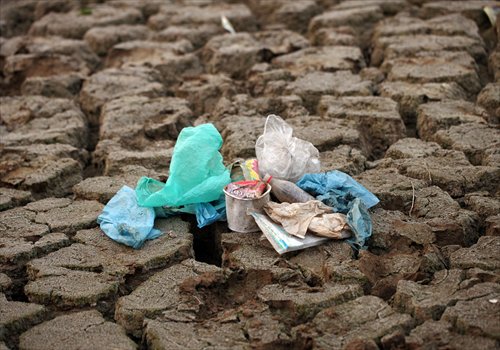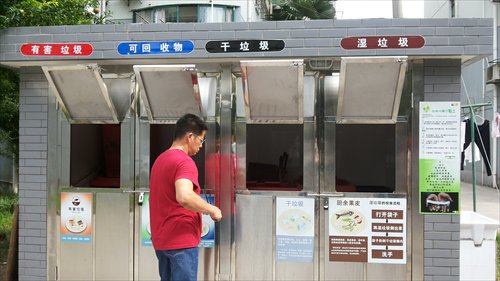It’s not all garbage
World Earth Day and International Year of Soils in Shanghai

Improperly treated household waste can be a source of soil pollution. Photo: IC
Dong Guifang sorts garbage at a residential compound near a metro station in Changning district. She pays a monthly fee of 800 yuan ($129) to the management company and she goes through the domestic garbage picking out recyclables which she sells on. For sorting the kitchen waste and dry waste as well she receives a 1,400-yuan subsidy from the government.
She has been making a living from garbage for more than 20 years. The thousands of garbage sorters like Dong are the workforce of Shanghai's garbage sorting and recycling system. In early 2000, Shanghai was nominated to be one of the country's eight garbage sorting pilot cities. Shanghai has to treat more than 20,000 tons of household waste a day, the most of any city in China.
Last May, Shanghai introduced a program of household garbage sorting which meant that city institutions and individuals had to sort their trash into four categories: dry, wet, toxic and recyclable. The city authorities said that by the end of 2017, 5 million households will be participating in this program and by that time, the city's current garbage sorters may no longer be needed.
Dong shrugged. "That's impossible," she said, adding that this plan would probably never succeed. "If I left here I'm sure that no one would volunteer to come and sort the garbage and the compound would be soon awash with bags of waste."
A critical issue
Today (April 22) is the 46th annual World Earth Day, and this year, 2015, has been nominated the International Year of Soils by the United Nations. While most people are vaguely aware that their household waste will wind up in the ground somewhere few have any idea how this happens or how critical soil pollution has become.
Unlike air or water pollution, Chinese people have little awareness about soil pollution. The problems of ascertaining exactly how much soil has been polluted in China, the cause of the pollutants, remedies and treatments have generally not been approached yet. Zhuang Guotai is the director of the Department of Nature and Ecology Conservation under the Ministry of Environmental Protection. He said: "We have dealt with air and water pollution for nearly 40 years, but have seldom tried to tackle soil pollution," the Jiefang Daily reported.
Some of the pollutants in the soil in China come from garbage buried underground. According to the city's environmental authorities, 70 percent of the daily household trash in Shanghai is buried in the city's suburbs. Every day the city's garbage fills a space of at least 13,440 cubic meters and finding this space is growing more and more difficult for a city with a limited area and a huge population.
Shanghai has two main landfills and the Laogang Landfill in Laogang town, Pudong New Area, deals with more than half of the city's daily household trash. Some 60 kilometers from downtown, Laogang was once famous for its primitive approach to garbage disposal, a method that caused serious environmental pollution in local areas.
In June 2011, reporters from the Oriental Morning Post visited Laogang and were initially struck by the stench from the landfill. One local resident told the reporters that the stink had been there for decades ever since the landfill came into use in the late 1980s. "Especially in summer, when the air is humid and the southeast winds are blowing, the stink is overwhelming," he said.
Environmentalist Song Hui has visited Laogang several times and was also struck by the smell. "In summer, even people living 25 kilometers from the landfill can still smell this," he told the Global Times.
As well as the stench, landfills have brought a lot of problems to Shanghai. It is very difficult to reuse land that has had garbage buried on it, Song said. "We can't build homes there. The Laogang management had tried to transform some of the land into golf courses, but this eventually proved impossible."
More seriously, the trash buried underground may permeate the surrounding soil and pollute the groundwater. According to Laogang town's government website, the Laogang landfill once seriously polluted local groundwater, making many local residents ill.

A man sorts trash at a Shanghai residential compound. Photo: Courtesy of the IFINE Environmental Protection Organization
More sorting needed
To help decrease the problems and inconveniences that landfills cause, environmental experts suggest the city does more garbage sorting. "After separating dry and wet waste, we can dissolve or recycle 20 to 30 percent of the garbage instead of simply burying or burning it," said Chen Haojing, an environmental engineer at a waste incineration plant in Pudong New Area.
Garbage sorting is what Song and his colleagues are promoting in some of the city's downtown residential compounds. As the director of the IFINE Environmental Protection Organization in Zhabei district, Song's big job is persuading residents to sort their garbage and showing them how to do this.
Since its founding in August 2012 IFINE has visited 45 residential compounds to teach residents how to sort their garbage. At the Guangsheng compound in Zhabei district IFINE staff spent three months in discussions with the property management company and the residents' committee, teaching residents how to sort garbage and selecting volunteers to continue the work when they left.
Every day, four volunteers stand beside the community's two garbage rooms to check whether the garbage is being sorted properly. Most of these volunteers are retired people and they are on duty four hours a day.
It took Song and his colleagues six months before the Guangsheng residents were sorting their garbage properly. "It takes time," Song said. He told the Global Times that it was sometimes very difficult to get people to adopt garbage sorting. "A lot of people think this is not their problem and some are just too lazy to put different trash in different bags." Of the 45 compounds that IFINE has worked with, only half are still sorting their garbage properly today.
In 2013 when Song visited an exclusive residential community in Pujiang town, Minhang district, trying to promote garbage sorting, he was told to leave by the property management company. "I could see dozens of bags of unsorted trash were randomly piled in front of a parking lot near the apartments, waiting for a garbage truck," he said.
Unsorted garbage goes straight to landfills or incineration plants. Sorted trash has other routes to take. Song followed a garbage truck in Zhabei district which was taking its wet garbage to a plant in Pudong New Area. Workers there wearing waterproof boots waded slowly through ponds of wet garbage picking out dry materials which hadn't been taken out by sorting. "It was not a good work environment," Song said.
After that, the wet garbage was dissolved or used to make fertilizer. Last year he got samples of the fertilizer from the plant and sent them to some of the residents at Guangsheng and other communities. "This was to show people that what they are doing is important - by sorting their trash they have made the trash useful and profitable."
Industrial pollution
But just sorting garbage is a long way from solving soil pollution problems. Industry contributes a lot more to polluted soils than household trash does. Last year China's first-ever report on soil pollution noted that 16 percent of the soil on the Chinese mainland was polluted.
The report, issued by China's Ministry of Environmental Protection and the Ministry of Land and Resources, suggested that the soil pollution was particularly serious in the country's several main industrial areas including the Yangtze River Delta industrial zone, which includes Shanghai and its surrounding provinces.
According to a director with the Shanghai Environmental Sanitation Engineering Design Institute, who asked not to be named, at present there are at least 10,000 polluted industrial sites across this city. When a factory is closed and the space is set aside for residential developments, any polluted soil there is generally ignored.
Polluted soil is a serious health hazard. The polluted soils have caused a lot of serious dangers. In 2004, three workers on a metro underground construction site in Beijing were poisoned and rushed to hospital. The metro construction area was located on the site of a pesticide factory which had been built in the 1970s but was long closed. Toxic materials remained in the ground there, however.
In 2006, several construction workers in Hubei Province were poisoned while building houses near the Han River. It was later revealed the soil there contained a substantial amount of pesticide and the construction project was put on hold for four years.
In 2013, several rice-producing areas across China were found to contain cadmium, a powerful carcinogen that can seriously damage human kidneys. An official report from the Ministry of Agriculture and the China National Rice Research Institute showed that a fifth of the country's farmlands have been polluted by heavy metals. Farmlands in 11 provinces have been found to contain unsafe levels of cadmium.
Shanghai is trying to deal with its 10,000 polluted sites by adding soil protection into its citywide environmental protection project. The project will last three years and will cost 100 billion yuan.
The city government finished a soil investigation for the city earlier this year. "The overall situation in Shanghai is not bad," said Zhang Quan, the director of the Shanghai Municipal Environmental Protection Bureau.
(Part of this article has been compiled from stories in the Oriental Morning Post and the Shanghai Law Journal.)